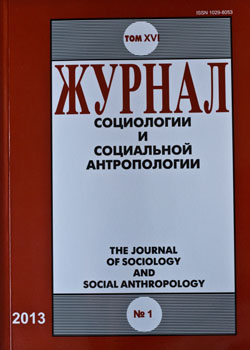The “Cultural Memory” of Russian-speaking Migrants in Germany: Impact on the Formation of New Identities of Immigrants from the Former Soviet Union
Keywords:
Russian-speaking space, Germany, “Russian Jews”, “Russian Germans”, cultural identity, cultural memory
Abstract
The article is based on the empirical study which was carried out in Germany in 2005-2006. It had as its focus those people who arrived in Munich from the former SU after the beginning of the perestroika (1985) under the adoption program for “Russian Jews” or “quota refuges” (Kontingentflüchtlinge) and “Russian Germans” or “late migrants” (Spätaussiedler). The phenomenological tradition in sociology (after Alfred Schütz) was the basis of that study. On the whole the author carried out 54 theme-centred interviews. Considering the difference between these two groups the main focus is given to their common features and the author considers them to be the basis for modern “Russian-speaking space” in Germany. Their representatives identify themselves as “people from the former Soviet Union”. Belonging to the “Russian-speaking space” presupposes not only the knowledge of the Russian language and culture but also the socialisation and enculturation in the former SU. These values and norms of behaviour did not vanish with the collapse of SU, but continue to be translated by the migrants from the former SU in their host places. To author’s opinion, it is the groups of Jewish and German migrants that present the “Soviet Russian-speaking culture” to the population of the host country now, though it is perceived in Germany as “Russian culture” and its bearers are taken for “Russian migrants”. Both the groups took advantage of their ethnic identity for the migration to Germany but on arrival it was found redundant for everyday life in the host country. Now the leading role is played by the “cultural identity” (it means the Soviet culture identity and the belonging of the migrants to the FSU culture). In this connection the FSU plays the integrative function and favours the formation of “Russian-speaking space” in Germany, which includes basically “Russian Jews” and “Russian Germans”.
Published
2013-02-10
How to Cite
Popkov, V. (2013). The “Cultural Memory” of Russian-speaking Migrants in Germany: Impact on the Formation of New Identities of Immigrants from the Former Soviet Union . ZHURNAL SOTSIOLOGII I SOTSIALNOY ANTROPOLOGII (The Journal of Sociology and Social Anthropology), 16(1), 148–166. Retrieved from http://jourssa.ru/jourssa/article/view/706
Section
Sociology of Migration

